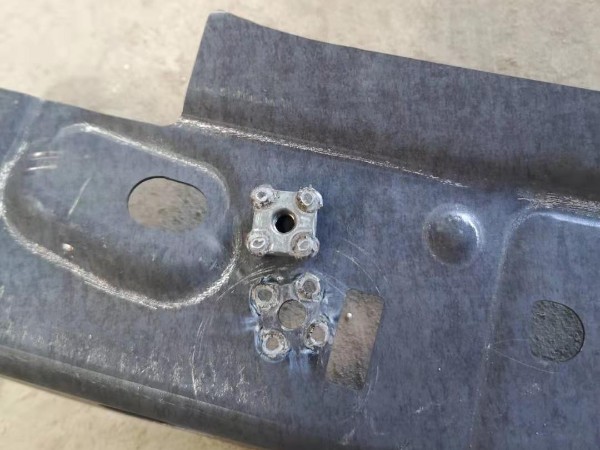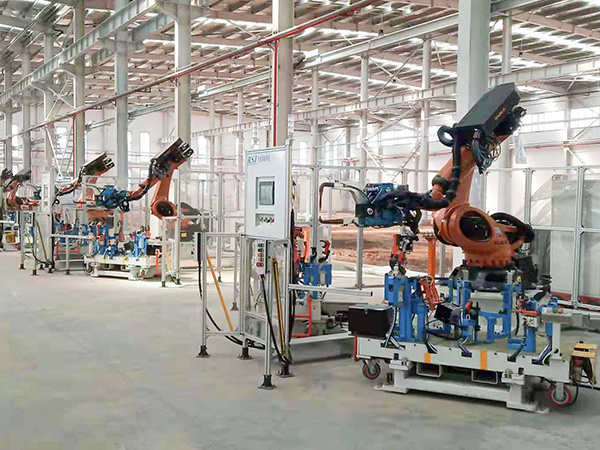熱門(mén)關(guān)鍵詞: 機(jī)器人點(diǎn)焊系統(tǒng)組成 點(diǎn)焊機(jī)多少錢(qián) 焊接工作站基本組成 螺母點(diǎn)焊機(jī)價(jià)格
熱成型板的普及使用也促使熱成型板的焊接技術(shù)要跟上潮流,下邊簡(jiǎn)單介紹下熱成型板的點(diǎn)焊工藝技術(shù)方法與流程-RSJ!
本文涉及一種適用于使用超高強(qiáng)度鋼的汽車(chē)白車(chē)身結(jié)構(gòu)強(qiáng)度焊接的方法,用于完成了車(chē)身GEO定位焊后增加車(chē)身結(jié)構(gòu)強(qiáng)度的白車(chē)身點(diǎn)焊,屬于汽車(chē)制造技術(shù)領(lǐng)域。
背景技術(shù):
隨著對(duì)汽車(chē)安全、節(jié)能等要求的提升,基于固溶強(qiáng)化、沉淀強(qiáng)化、細(xì)化晶粒、位錯(cuò)強(qiáng)化和相變強(qiáng)化(馬氏體)的超高強(qiáng)度鋼進(jìn)入了實(shí)際生產(chǎn)應(yīng)用階段。為了提高和滿足碰撞安全性能并提高車(chē)身部件強(qiáng)度,超高強(qiáng)度熱成型剛點(diǎn)焊性能和技術(shù)的重要性就凸顯了出來(lái)。
傳統(tǒng)的汽車(chē)白車(chē)身使用的是鍍鋅板,兩層鍍鋅板焊接時(shí),使用鐵屑進(jìn)行夾緊定位。由于高強(qiáng)度熱成型鋼本身的材料特性,熱成型鋼白車(chē)身的焊接技術(shù)需要更強(qiáng)的焊接壓力、更長(zhǎng)的焊接時(shí)間和能量,故傳統(tǒng)的定位銷無(wú)法滿足高強(qiáng)度的夾具定位需求,其耐磨性和強(qiáng)度都達(dá)不到工藝要求,無(wú)法滿足焊接尺寸和固定定位尺寸精度的要求。在不滿足精度的環(huán)境情況下,如果兩層鋼板直接搭接和預(yù)壓會(huì)出現(xiàn)空隙或者出現(xiàn)在非規(guī)劃的位置焊接的情況,對(duì)汽車(chē)整體的產(chǎn)品質(zhì)量和結(jié)構(gòu)強(qiáng)度有著較大的影響。
技術(shù)實(shí)現(xiàn)要素:
本發(fā)明要解決的技術(shù)問(wèn)題是如何對(duì)超高強(qiáng)度鋼的汽車(chē)白車(chē)身進(jìn)行定位和點(diǎn)焊。
為了解決上述技術(shù)問(wèn)題,本發(fā)明的技術(shù)方案是提供一種熱成型鋼白車(chē)身點(diǎn)焊方法,其特征在于,步驟為:
步驟1:將熱成型鋼汽車(chē)白車(chē)身的兩層鋼板的焊接面相互貼合;
步驟2:將所述兩層鋼板通過(guò)陶瓷定位銷夾緊定位;
步驟3:在所述兩層鋼板上待點(diǎn)焊處外側(cè)分別設(shè)置一電極帽;
步驟4:給兩個(gè)電極帽之間施加焊接電流和焊接壓力,使得所述兩層鋼板上待點(diǎn)焊處熔融并固化成焊接接頭。
優(yōu)選地,所述電極帽經(jīng)過(guò)了用于提高硬度的熱處理工藝。
優(yōu)選地,所述步驟4中,焊點(diǎn)剪切強(qiáng)度位移≤5s/mm。
優(yōu)選地,所述步驟4中,電極縮進(jìn)量一致性≥97%。
優(yōu)選地,所述步驟4中,當(dāng)兩層鋼板中的薄板厚度為0.75~1mm時(shí),焊接壓力為3.9~4.3KN,焊接時(shí)間為330~440ms,焊接電流為10~12ms,電極帽直徑為16mm。
優(yōu)選地,所述步驟4中,當(dāng)兩層鋼板中的薄板厚度為1.1~2mm時(shí),焊接壓力為4.4~6KN,焊接時(shí)間為460~660ms,焊接電流為12.5~15.5ms,電極帽直徑為16~20mm。
優(yōu)選地,所述步驟4中,焊接參數(shù)如表1所示:
表1 熱成型鋼焊接參數(shù)表
表1中,板厚表示兩層鋼板中的薄板厚度,接觸面直徑表示電極帽端面與鋼板接觸面的直徑
相比現(xiàn)有技術(shù),本發(fā)明具有如下有益效果:
1、配套熱成型鋼的使用,電極帽采用高硬度熱處理,提高配套夾具整體精度和耐磨使用壽命;
2、采用陶瓷銷作為夾具的定位,有著彎曲強(qiáng)度高和電絕緣的特點(diǎn),安全,且能減少后續(xù)清理焊渣的工作量;
3、采用新焊接工藝參數(shù)和高強(qiáng)度配套夾具的模式,提高產(chǎn)品一次合格率,提高了生產(chǎn)效率;
4、高精度焊接夾具的配套使用,從縮短工位停機(jī)時(shí)間入手,有效降低了焊裝車(chē)間的綜合成本;
5、首次將陶瓷定位銷和經(jīng)高硬度熱處理工藝的電極帽壓塊引入熱成型鋼點(diǎn)焊領(lǐng)域,推進(jìn)了焊接整體工藝的進(jìn)步。
附圖說(shuō)明
圖1為熱成型鋼白車(chē)身點(diǎn)焊時(shí)示意圖;
圖2為傳統(tǒng)板材和熱成型鋼焊接壓力與板厚關(guān)系對(duì)比圖;
圖3為傳統(tǒng)板材和熱成型鋼焊接時(shí)間與板厚關(guān)系對(duì)比圖;
圖4為傳統(tǒng)板材和熱成型鋼焊接電流與板厚關(guān)系對(duì)比圖。


具體實(shí)施方式
下面結(jié)合具體實(shí)施例,進(jìn)一步闡述本發(fā)明。應(yīng)理解,這些實(shí)施例僅用于說(shuō)明本發(fā)明而不用于限制本發(fā)明的范圍。此外應(yīng)理解,在閱讀了本發(fā)明講授的內(nèi)容之后,本領(lǐng)域技術(shù)人員可以對(duì)本發(fā)明作各種改動(dòng)或修改,這些等價(jià)形式同樣落于本申請(qǐng)所附權(quán)利要求書(shū)所限定的范圍。
一種熱成型鋼白車(chē)身點(diǎn)焊方法,步驟為:
步驟1:將熱成型鋼汽車(chē)白車(chē)身的兩層鋼板的焊接面1相互貼合,如圖1所示;
步驟2:兩層鋼板通過(guò)陶瓷定位銷2夾緊定位;
步驟3:兩層鋼板上待點(diǎn)焊處外側(cè)分別設(shè)置一電極帽3;電極帽3使用了高硬度熱處理工藝,以保證白車(chē)身焊接過(guò)程中尺寸的穩(wěn)定性;
步驟4:給兩個(gè)電極帽3之間施加焊接電流和焊接壓力,使得兩層鋼板上待點(diǎn)焊處熔融并固化成焊接接頭。
陶瓷定位銷的技術(shù)指標(biāo)如下:
1)超強(qiáng)的耐磨性:
壓縮強(qiáng)度(MPa):2300
彎曲強(qiáng)度(MPa):240
彈性比率(GPa):280
2)防粘附性:可以有效減少焊渣,灰塵的附著;
3)電絕緣:滿足沃爾沃嚴(yán)格的全球絕緣技術(shù)規(guī)范要求;
4)高溫下的超高強(qiáng)度,耐熱性(℃):1700
5)使用壽命超長(zhǎng):確保焊接工藝最小的廢品率以及最短的停機(jī)時(shí)間,有效降低焊裝車(chē)間的綜合成本。
本實(shí)施例所采用的陶瓷銷的型號(hào)有:D15-040960385(31915024),D13-034422378(31915023),D15-040962889(31553145)。
熱成型鋼點(diǎn)焊的技術(shù)指標(biāo)如下:
1)點(diǎn)焊焊接速度:2s/點(diǎn);
2)焊點(diǎn)剪切強(qiáng)度位移:≤5s/mm;
3)電極縮進(jìn)量(熱成型鋼母材剩余厚度)一致性≥97%
4)焊槍的焊接壓力為普通鍍鋅板材的2倍。
對(duì)傳統(tǒng)的鍍鋅板和本發(fā)明熱成型鋼(硼鋼-Boron-Steel)進(jìn)行多次實(shí)驗(yàn)過(guò)程,并控制同樣板厚,以進(jìn)行焊接參數(shù)的對(duì)比,從而實(shí)現(xiàn)焊接理論和實(shí)踐相結(jié)合,得出熱形成鋼白車(chē)身的焊接工藝參數(shù)設(shè)置規(guī)律,實(shí)現(xiàn)對(duì)熱成型剛車(chē)身焊接在實(shí)際生產(chǎn)工藝中的應(yīng)用。根據(jù)點(diǎn)焊電阻參數(shù)標(biāo)ES-6M2A-1K251-A*,電極參數(shù)根據(jù)ISO5821實(shí)施,針對(duì)碳鋼的層疊焊接、高強(qiáng)度涂層鋼的層疊焊接及合金板材GMT焊接進(jìn)行焊接參數(shù)的實(shí)驗(yàn)探索,實(shí)驗(yàn)數(shù)據(jù)如下:
表1 熱成型鋼焊接參數(shù)表
表2 傳統(tǒng)板材焊接參數(shù)表
熱成型鋼與傳統(tǒng)板材焊接參數(shù)分別如表1和表2所示,傳統(tǒng)板材和熱成型鋼焊接壓力與板厚關(guān)系對(duì)比如圖1所示,傳統(tǒng)板材和熱成型鋼焊接時(shí)間與板厚關(guān)系對(duì)比如圖2所示,傳統(tǒng)板材和熱成型鋼焊接電流與板厚關(guān)系對(duì)比如圖3所示。
由上述數(shù)據(jù)可以看出:
一、焊接電流、電壓和焊接時(shí)間在熱成型鋼上的應(yīng)用設(shè)置,根據(jù)板厚的不同,變化曲線及趨勢(shì)相對(duì)普通鍍鋅板幾乎一致;
二、熱成型鋼的白車(chē)身焊接壓力相比鍍鋅板起點(diǎn)壓力要求較高,隨著板厚的增加相比鍍鋅板的焊接壓力增幅從70%下降到30%左右;
三、由于熱成型鋼細(xì)化晶粒、位錯(cuò)強(qiáng)化和相變強(qiáng)化(馬氏體)的特點(diǎn),焊接時(shí)間相比鍍鋅板的增幅在100%左右,需要更長(zhǎng)的焊接保壓時(shí)間以熔穿鋼板,不足夠的焊接保壓時(shí)間在實(shí)驗(yàn)中會(huì)造成虛焊或焊接強(qiáng)度不夠等各種質(zhì)量欠缺的問(wèn)題,故足夠的焊接時(shí)間針對(duì)熱成型剛是必須的;
四、熱成型鋼的焊接電流,相比鍍鋅板相差無(wú)幾,即當(dāng)焊接同板厚時(shí)所需的能量幾乎一致;
五、綜合比較熱成型鋼(硼鋼)的焊接參數(shù),較傳統(tǒng)鍍鋅板在保持焊點(diǎn)尺寸和電極帽尺寸的情況下,各項(xiàng)焊接參數(shù)均需要提升30%~100%以滿足熱成型鋼的焊接需求。
為配套熱成型鋼的使用,本發(fā)明創(chuàng)新性地利用陶瓷銷作為夾具的定位,并同時(shí)對(duì)電極帽壓塊使用了高硬度熱處理工藝,以保證白車(chē)身焊接過(guò)程中尺寸的穩(wěn)定性,提高配套夾具整體精度和耐磨使用壽命。
在工藝參數(shù)方面,通過(guò)不斷的測(cè)試和檢測(cè)焊接質(zhì)量、焊接剪切強(qiáng)度位移及測(cè)試焊接后的電極縮進(jìn)量等,將熱成型鋼的焊接電流、焊接壓力和焊接保壓時(shí)間等固化和保留下來(lái),開(kāi)創(chuàng)并建立了國(guó)內(nèi)熱成型鋼白車(chē)身焊接的一套技術(shù)指標(biāo)。
通過(guò)陶瓷定位銷和焊接工藝參數(shù)的使用,不僅可以提高白車(chē)身的焊接定位精度,同時(shí)可以補(bǔ)全熱成型鋼白車(chē)身應(yīng)用領(lǐng)域的實(shí)踐空白,為制定行業(yè)標(biāo)準(zhǔn)和提高焊接速率提供了基礎(chǔ)。
更多熱成型焊接技術(shù)詳情請(qǐng)聯(lián)系昆山榮仕杰!點(diǎn)擊本網(wǎng)站首頁(yè)觀看視頻資料。
英文版;
This paper relates to a method for strength welding of automobile body-in-white structure using ultra-high-strength steel. It is used to complete the body-in-white spot welding which increases the structural strength of the vehicle body after GEO welding.
It belongs to the field of automobile manufacturing technology.
Background technique:
With the improvement of requirements for safety and energy saving of automobiles, ultra-high-strength steels based on solid solution
strengthening, precipitation strengthening, grain refinement, dislocation strengthening and phase transformation strengthening (martensite) have entered the practical production application stage. In order to improve and meet crash safety performance
and increase the strength of body parts, the importance of ultra-high strength thermoforming just spot welding performance and technology is highlighted.
The traditional car body-in-white uses a galvanized sheet, and when the two-layer galvanized
sheet is welded, it is clamped and positioned using iron filings. Due to the material properties of high-strength thermoformed steel, the welding technology of thermoformed steel body-in-white requires stronger welding pressure, longer welding time and
energy, so the traditional positioning pin can not meet the high-strength fixture positioning requirements. The wear and strength are not up to the process requirements, and the welding size and the fixed positioning dimensional accuracy cannot be met.
In the case of an environment that does not meet the accuracy, if the two layers of steel plates are directly overlapped and pre-stressed, there will be voids or welding in an unplanned position, which has a great influence on the overall product quality
and structural strength of the automobile.
Technical realization elements:
The technical problem to be solved by the present invention is how to position and spot weld the automobile white body of ultra high strength
steel.
In order to solve the above technical problem, the technical solution of the present invention is to provide a hot-formed steel body-in-white spot welding method, characterized in that the steps are:
Step 1: bonding the welding
faces of the two layers of steel plates of the hot-formed steel automobile body-in-white;
Step 2: clamping and positioning the two-layer steel plate through a ceramic positioning pin;
Step 3: respectively, an electrode cap is respectively
disposed on the outer side of the two-layer steel plate to be spot-welded;
Step 4: Apply welding current and welding pressure between the two electrode caps, so that the spot welding on the two steel plates is melted and solidified into a welded
joint.
Preferably, the electrode cap is subjected to a heat treatment process for increasing hardness.
Preferably, in the step 4, the joint shear strength displacement is ≤5 s/mm.
Preferably, in the step 4, the electrode
retraction amount is consistent by ≥97%.
Preferably, in the step 4, when the thickness of the thin plate in the two-layer steel plate is 0.75 to 1 mm, the welding pressure is 3.9 to 4.3 KN, the welding time is 330 to 440 ms, the welding current
is 10 to 12 ms, and the electrode cap diameter is 16 mm. .
Preferably, in the step 4, when the thickness of the thin plate in the two-layer steel plate is 1.1 to 2 mm, the welding pressure is 4.4 to 6 KN, the welding time is 460 to 660 ms,
the welding current is 12.5 to 15.5 ms, and the electrode cap diameter is 16 ~20mm.
Preferably, in the step 4, the welding parameters are as shown in Table 1:
Table 1 Thermoforming steel welding parameters table
In Table
1, the plate thickness indicates the thickness of the thin plate in the two-layer steel plate, and the diameter of the contact surface indicates the diameter of the contact face of the electrode cap and the steel plate.
Compared with the prior
art, the present invention has the following beneficial effects:
1. The use of matching thermoformed steel, the electrode cap adopts high hardness heat treatment to improve the overall precision and wear life of the supporting fixture;
2. The ceramic pin is used as the positioning of the fixture, which has the characteristics of high bending strength and electrical insulation, is safe, and can reduce the workload of subsequent cleaning of the welding slag;
3. Adopt new
welding process parameters and high-strength supporting fixture mode to improve the first pass rate of products and improve production efficiency;
4. The matching use of high-precision welding fixtures starts with shortening the station downtime,
which effectively reduces the comprehensive cost of the welding shop;
5. For the first time, ceramic locating pins and electrode cap briquettes with high hardness heat treatment process were introduced into the field of thermoforming steel
spot welding, which promoted the progress of the overall welding process.
DRAWINGS
Figure 1 is a schematic view of a hot-formed steel body-in-white spot welding;
Figure 2 is a comparison diagram of the relationship between
the welding pressure and the plate thickness of the conventional sheet and the thermoformed steel;
Figure 3 is a comparison diagram of the relationship between welding time and plate thickness of conventional sheet and thermoformed steel;
Figure 4 is a comparison of welding current and plate thickness of conventional sheet and thermoformed steel.
detailed description
The invention is further illustrated below in conjunction with specific embodiments. It is
to be understood that the examples are not intended to limit the scope of the invention. In addition, it should be understood that various changes and modifications may be made by those skilled in the art in the form of the present invention.
A hot-formed steel body-in-white spot welding method, the steps are:
Step 1: bonding the welding faces 1 of the two-layer steel plate of the hot-formed steel automobile body-in-white to each other, as shown in FIG. 1;
Step 2: The
two-layer steel plate is clamped and positioned by the ceramic positioning pin 2;
Step 3: an electrode cap 3 is respectively disposed on the outer side of the two-layer steel plate to be spot-welded; the electrode cap 3 uses a high-hardness
heat treatment process to ensure dimensional stability during the body-in-white welding process;
Step 4: Apply welding current and welding pressure between the two electrode caps 3, so that the spot welding on the two steel plates is melted
and solidified into a welded joint.
The technical specifications of ceramic positioning pins are as follows:
1) Superior wear resistance:
Compressive strength (MPa): 2300
Bending strength (MPa): 240
Elastic ratio (GPa): 280
2) Anti-adhesion: It can effectively reduce the adhesion of welding slag and dust;
3) Electrical insulation: meet Volvo's strict global insulation technical specifications;
4) Ultra high strength
at high temperature, heat resistance (°C): 1700
5) Long service life: ensuring the lowest scrap rate and the shortest downtime of the welding process, effectively reducing the overall cost of the welding shop.
The types of ceramic
pins used in this embodiment are: D15-040960385 (31915024), D13-034422378 (31915023), D15-040962889 (31553145).
The technical specifications of hot-formed steel spot welding are as follows:
1) Spot welding speed: 2s/point;
2) Welding point shear strength displacement: ≤ 5s / mm;
3) The amount of electrode indentation (residual thickness of thermoformed steel base material) is ≥97%
4) The welding pressure of the welding torch is twice that of ordinary
galvanized sheet.
The traditional galvanized sheet and the hot-formed steel (Boron-Steel) of the present invention were subjected to a plurality of experimental processes, and the same thickness was controlled to compare the welding parameters,
thereby realizing the combination of welding theory and practice. The welding process parameter setting law of the hot-formed steel body-in-white is realized, and the application of the hot-formed body welding in the actual production process is realized.
According to the spot welding resistance parameter standard ES-6M2A-1K251-A*, the electrode parameters are implemented according to ISO5821, and the experimental research on welding parameters of laminated welding of carbon steel, laminated welding of
high-strength coated steel and GMT welding of alloy sheet, experimental data as follows:
Table 1 Thermoforming steel welding parameters table
Table 2 Traditional plate welding parameter table
The welding parameters of
thermoformed steel and traditional plate are shown in Table 1 and Table 2. The relationship between welding pressure and plate thickness of traditional plate and thermoformed steel is shown in Figure 1. The relationship between welding time and plate
thickness of traditional plate and thermoformed steel is For example, as shown in Figure 2, the relationship between welding current and plate thickness of conventional sheet and thermoformed steel is shown in Figure 3.
It can be seen from
the above data:
First, the welding current, voltage and welding time on the hot-formed steel application settings, according to the thickness of the plate, the curve and trend is almost the same as ordinary galvanized sheet;
Second,
the white body welding pressure of the hot-formed steel is higher than the starting pressure of the galvanized sheet. As the thickness increases, the welding pressure increase of the galvanized sheet decreases from 70% to about 30%;
Third,
due to the characteristics of refinement grain, dislocation strengthening and phase transformation strengthening (martensite) of thermoformed steel, the welding time is about 100% higher than that of galvanized sheet, which requires a longer welding dwell
time to melt Wearing steel plates, insufficient welding dwell time will cause various problems such as insufficient welding or insufficient welding strength in the experiment, so sufficient welding time is necessary for thermoforming;
Fourth,
the welding current of the hot-formed steel is almost the same as that of the galvanized sheet, that is, the energy required for welding the same plate thickness is almost the same;
V. Comprehensive comparison of the welding parameters of hot-formed
steel (boron steel). Compared with the traditional galvanized sheet, the welding parameters need to be increased by 30% to 100% to meet the hot-rolled steel. Welding requirements.
In order to support the use of thermoformed steel, the invention
innovatively utilizes the ceramic pin as the positioning of the fixture, and at the same time uses a high hardness heat treatment process for the electrode cap compact to ensure dimensional stability during the body-in-white welding process and improve
the supporting fixture. Overall accuracy and wear life.
In terms of process parameters, the welding current, welding pressure and welding holding time of the hot formed steel are solidified and retained by continuous testing and testing of
welding quality, welding shear strength displacement and testing of electrode shrinkage after welding. Created and established a set of technical indicators for domestic thermoforming steel body-in-white welding.
Through the use of ceramic
locating pins and welding process parameters, not only can the welding body positioning accuracy be improved, but also the practice gap in the field of hot-formed steel body-in-white can be complemented, which provides a basis for setting industry standards
and increasing welding rate.
For more details on thermoforming welding technology, please contact Kunshan Rongshijie! Click on the homepage of this website to watch the video material.



咨詢熱線
400-693-3363